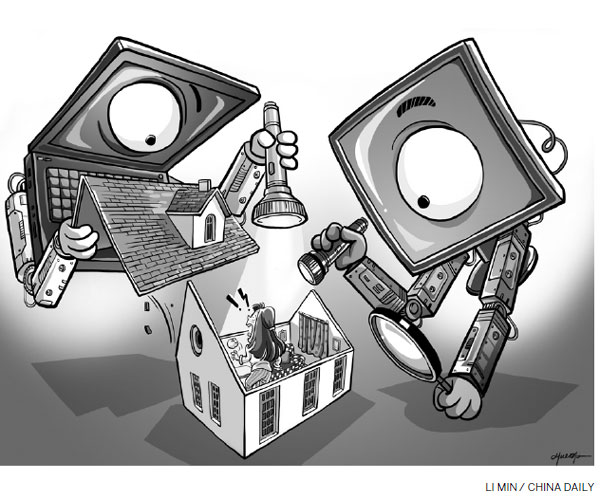
The life of Lu Qin, a young woman involved in an unsavory traffic incident in Chengdu, capital of Southwest China's Sichuan province, has been hell over the past week.
Her predicament started with a thrashing she received from a male driver, surnamed Zhang, for changing lanes dangerously while driving on an expressway. Video clips of the incident went viral online after being uploaded on the Internet and then aired by a local TV station.
While the brutality of Zhang sparked a public outcry, another video filmed by his dashboard camera changed public opinion, at least on the Internet. The second video shows Zhang being forced to pull the brakes several times because Lu kept changing lanes even though she could cause a major accident. At one point, Zhang narrowly missed hitting a cyclist. Zhang, who is now in custody, told police that he was outraged because Lu posed a threat to the safety of his one-year-old son in the car.
The second video triggered a wave of criticisms against Lu and started a cyber campaign to collect details about her life. Within hours, her name, home address, information on her family and unverified records of her traffic law violations were dug out and posted on various online forums. A netizen claimed to have found Lu's hotel check-in records and even figure out her menstrual period, based on the records.
On May 11, Lu, who is still in hospital with broken ribs, a concussion and bruises all over her body, issued a public apology through a local newspaper, after initially denying any wrongdoing.
If the beating she received was the first blow, the cyber violence that followed was an even bigger blow.
The entire episode is bizarre, to say the least: the victim of violence becomes the condemned while the perpetrator gets public sympathy.
Indeed, Lu should learn a serious lesson from the incident and follow all traffic rules. But neither her private life nor her family has anything to do with the incident, and there is no connection between when and which hotels she checked into and her reckless driving. She deserves punishment for breaking traffic rules, but certainly not the cyber bombardment.
Her family has threatened to move court to safeguard its privacy. But it is defenseless against the vast number of "marauding" netizens. Her family members cannot point out with certainty the Internet users who have infringed upon their privacy, and without a defendant, no court will accept their case.
This is cause for alarm. Some basic personal facts about a person are available on the Internet (which in Lu's case could have been obtained through her car's number plate). But her hotel check-in record should have been off-limits to outsiders, because of its private nature.
The disturbing development should prompt the government to strengthen the protection of individual's private information and take measures to punish those who leak them without valid reason.
Considering that anyone could become the next Lu, people who love cyber bombardment just for fun should rethink their actions. Perhaps they could start by apologizing to Lu.
The author is an editor with China Daily. lifangchao@chinadaily.com.cn

I’ve lived in China for quite a considerable time including my graduate school years, travelled and worked in a few cities and still choose my destination taking into consideration the density of smog or PM2.5 particulate matter in the region.